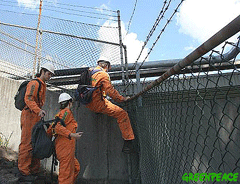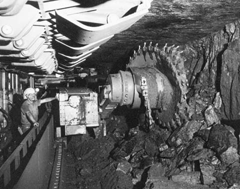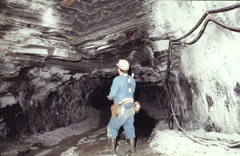Aussie Miners Tackle Global Warming
Air Date: Week of April 13, 2007

Greenpeace activists shutdown Kooragang Island coal loader in Newcastle, the NSW's largest coal loader, in an effort to warn people about the government's expansion plans for the coal industry. The coal industry is one of the biggest causes of climate change. (Photo: (c) Greenpeace)
Australia is the world’s largest coal exporting nation and the coal makes a significant contribution to global warming when it’s burned. The government has refused to ratify the Kyoto climate change treaty, in an effort to protect the country’s coal industry. But in an unusual twist, the Australian coal miner’s union has taken a stand to support renewable energy and address global warming. Mark Tamhane reports.
Transcript
CURWOOD: Australia and the United States are the only two industrialized countries that have so far refused to ratify the Kyoto treaty that puts a cap on global warming gases. A dependence on heavily polluting coal is a major reason why. Just about half of US electricity comes from coal, and Australia is the world’s largest exporter of coal. Faced with tight carbon restrictions under Kyoto, the coal industry in both nations has been leery of the treaty. But now the union that represents Australian coal miners is taking a different approach. It’s calling for a bold strategy to fight global warming. Mark Tamhane has our report.
[GREENPEACE RAID]
TAMHANE: Coal is Australia's most lucrative export. Now it's become highly controversial as well.
[GREENPEACE RAID]
TAMHANE: In February this year activists from the environmental group Greenpeace filmed themselves disabling a coal-loading facility in Newcastle. Located at the river mouth of the Hunter Valley, the city is the world's busiest coal export gateway. Greenpeace Australia's Energy campaigner is Ben Pearson.
PEARSON: Four activists entered the terminal, pulled the safety chain, which shuts down the conveyors and then locked themselves to the conveyer. They were able to stay there for two hours and we estimate to stop the loading of about 14-thousand tons of coal. When you burn coal you get greenhouse pollution, which fuels climate change. That is the greatest threat we face on this planet. That is why coal is deadly.
TAMHANE: These actions and the publicity they generate, make Tony Maher furious. He's the president of the powerful Construction, Forestry, Mining and Energy Union- the CFMEU. It represents nearly all of the workforce in Australia's coal mining and power generation industries.
MAHER: You go round the mining communities and people tell you that they're effectively demonized. The local papers are always saying that the industry should be closed down or stifled in some way and that coal mining is the cause of the drought, and global warming, and, so people do feel very uncomfortable about that. Miners' families, kids, get taught at school that coal mining's a bad thing.
TAMAHANE: Tired of being painted as out-of-touch environmental vandals by groups like Greenpeace, the coal miner's union has decided to adopt its own climate change policy. Maher claims it's the most progressive stance by any coal miners' union in the world.
MAHER: Well, our policy is pretty simple. Ratify Kyoto, increase mandatory renewable energy targets- it's a paltry two percent now, it should go to five and ten percent, and perhaps beyond. Miners should have no fear about renewable energy, um and there should be a price signal on carbon- that's best done through a carbon-trading scheme. We support that.

Underground mining in Australia- the world's largest coal exporting nation. (Courtesy of Australian Coal Association)
HOWARD EX PARLIAMENT: You'll never be able to generate base-load power using solar and wind. I mean the only things that will ever replace the current dirty power stations are, ah, cleaner uses of fossil fuel or nuclear power.
TAMHANE: With no existing nuclear power stations in Australia, or on the drawing board, that means coal will be king for a long time to come.
[SOUND OF TRUCK REVVING UP, LOAD OF COAL IS DUMPED]
TAMHANE: At the other end of the Hunter Valley lies Bulga coal mine. Here, giant machines rip at the black ground, while trucks three stories high cart away tons of coal. The scene is repeated 24 hours a day, seven days a week at this open pit mine. Mechanic Lloyd Hill keeps these giant machines going- something he’s done for 25 years.
[SOUND IN COFFEE SHOP, CHATTING IN BACKGROUND]
TAMHANE: Relaxing in a coffee shop after a long shift, Lloyd Hill says he'd still recommend coal mining as a career.
HILL: I enjoy the work, it's hard work. The biggest challenge is the hours, the 12-hour shifts, it's long and tedious, but I think it's something most people would stay with. Certainly I would recommend it for most people to go into, as long as they have the will to do the job.
TAMHANE: But there's no getting away from the fact that under current technologies each ton of coal mined at Bulga will produce up to two and a half tons of greenhouse gases when it's burned. And there are growing calls for people like Lloyd Hill to be the last generation of Australians employed in coal mining. So there were raised eyebrows when Hill and his coworkers first heard about the union's proposal for a Greenhouse policy.
HILL: Initially, when the first reaction is the workforce see it as losing jobs, but once you explain to them that it's the way of the future, the way that it needed to be and that it's a proactive stance by the union, they come around. And the mine where I worked at, it was 100 percent supported.
TAMHANE: The Union's new platform states that the nation has a moral obligation that extends beyond its borders. Australia should help developing countries burn its coal in the cleanest possible way. On this point, the union and the government agree. Prime Minister Howard says the greatest contribution Australia can make in the fight against global warming is to export homegrown "clean coal" and carbon capture technologies to energy-hungry countries like China and India. Even though experts agree these innovations may not be commercially viable for years. So who is going to pay to develop this technology? The president of the Construction, Forestry, Mining and Energy Union, Tony Maher, says it should be the coal mining and power generation companies.

Surveying horizontal stresses in an Australian coal mine. (Courtesy of CDC)
TAMHANE: The National Coal Association declined to be interviewed on tape, but a spokesman said the industry's spending considerably more than 300 million dollars on "clean coal" development. Meanwhile, the miner's union has bought shares in all the major coal companies, so members can attend shareholder meetings and argue for more investment in "clean coal." It's pressing U.S. and European pension funds to do the same with coal companies that have Australian operations.
Tony Maher is adamant the union's sudden interest in being Greenhouse friendly, isn't motivated by more mercenary aims...like a new membership drive.
MAHER: In terms of renewables, it's been put to me many times that we should support wind farms or solar panels and we should try to get coverage of those workers. My view is that we need to develop a good position for all the right reasons, not for the wrong reasons, so we won't do that.
TAMHANE: Tony Maher is blunt.
MAHER: Look I think we'll stay the concrete it, chop it down, dig it up, and burn it union!
[SOUND OF TRUCKS]
TAMHANE: For Living on Earth, I'm Mark Tamhane in Australia's Hunter Valley.
Links
Construction Forestry Mining and Energy Union (CFMEU) Climate Change Policy
XStrata Coal: the location of Bulga Coal Mine
Coal 21 (the $300 million fund the Australian Coal Association has set up to investigate clean coal)
Living on Earth wants to hear from you!
Living on Earth
62 Calef Highway, Suite 212
Lee, NH 03861
Telephone: 617-287-4121
E-mail: comments@loe.org
Newsletter [Click here]
Donate to Living on Earth!
Living on Earth is an independent media program and relies entirely on contributions from listeners and institutions supporting public service. Please donate now to preserve an independent environmental voice.
NewsletterLiving on Earth offers a weekly delivery of the show's rundown to your mailbox. Sign up for our newsletter today!
 Sailors For The Sea: Be the change you want to sea.
Sailors For The Sea: Be the change you want to sea.
 The Grantham Foundation for the Protection of the Environment: Committed to protecting and improving the health of the global environment.
The Grantham Foundation for the Protection of the Environment: Committed to protecting and improving the health of the global environment.
 Contribute to Living on Earth and receive, as our gift to you, an archival print of one of Mark Seth Lender's extraordinary wildlife photographs. Follow the link to see Mark's current collection of photographs.
Contribute to Living on Earth and receive, as our gift to you, an archival print of one of Mark Seth Lender's extraordinary wildlife photographs. Follow the link to see Mark's current collection of photographs.
 Buy a signed copy of Mark Seth Lender's book Smeagull the Seagull & support Living on Earth
Buy a signed copy of Mark Seth Lender's book Smeagull the Seagull & support Living on Earth

